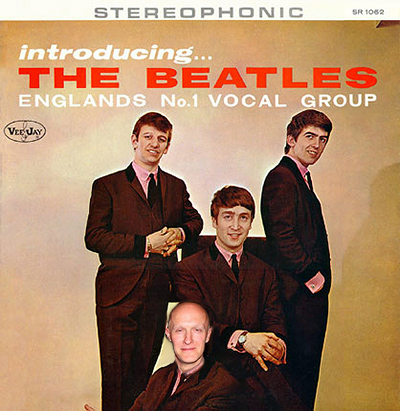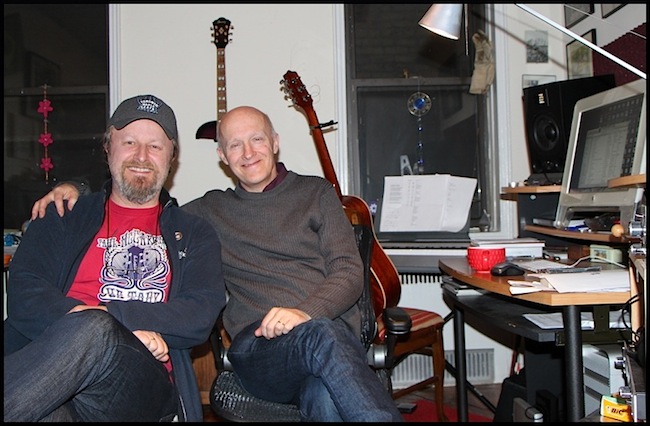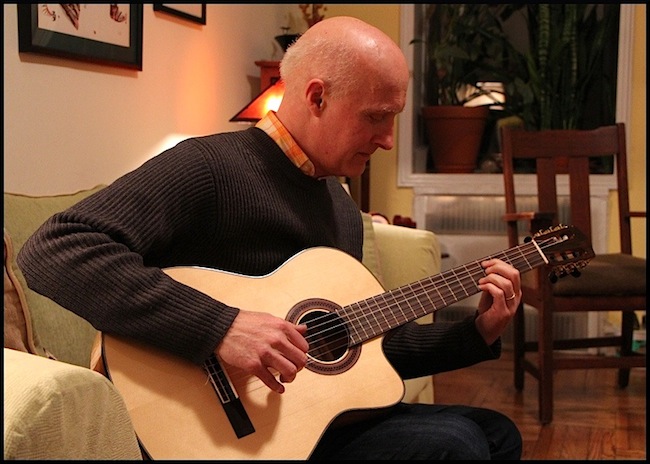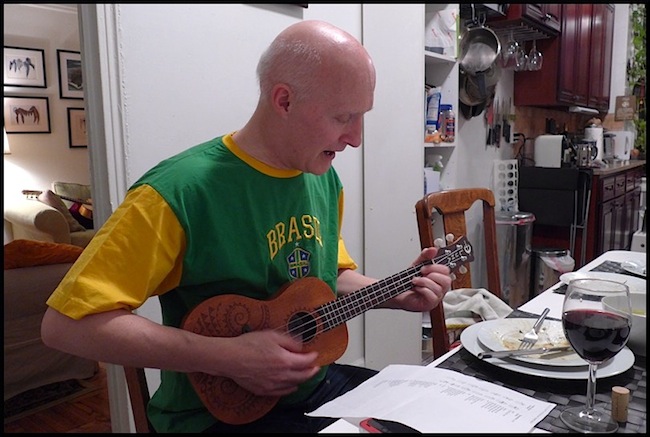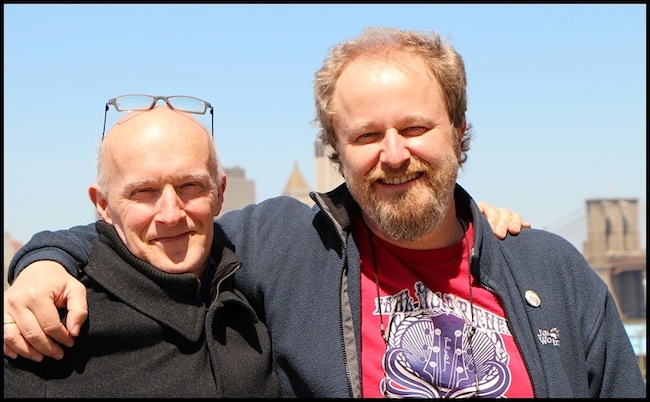(Text + Fotos: © Ansgar Bellersen – Verwendung nur mit ausdrücklicher Genehmigung)
Nicht nur Gottes Wege sind unergründlich, sondern auch die des Internets. Vor etwa vier, fünf Jahren stattete ich dem Onlineshop CDBaby wieder mal einen Besuch ab. Auf dieser US-amerikanischen Homepage kann man CDs von unabhängigen Künstlern ohne Plattenvertrag erwerben. Viele klagen darüber, dass es heutzutage angeblich keine gute Musik mehr gäbe. Doch die gibt es sehr wohl – sie ist nur manchmal nicht so einfach zu finden. Die Seite dieses Online-Händlers CDBaby stellt eine Ausnahme dar. Hier kann man nach musikalischen Vorlieben suchen und fündig werden. So gab ich bei der Suche wie gewohnt „Klingt wie Beatles“ (bzw. Lennon, McCartney & Harrison) ein. In den Suchergebnissen fand sich u.a. das Album „Tumbling Years“ von Felix van Dijk. Die Hörproben konnten mich überzeugen, so dass ich das Album bestellte. Es mögen danach zwei Jahre vergangen sein, als ich Felix van Dijk über Facebook eine Freundschaftsanfrage stellte.
Mit der Zeit wuchs die Erkenntnis, dass dieser Kontakt über die oftmals oberflächlichen Facebook-Freundschaften hinausgehen würde. Neben den gemeinsamen musikalischen Interessen wuchs auch die Sympathie, so dass die Unterhaltungen im Facebook-Chat an Häufigkeit und Intensität zunahmen. Meine Freude war groß, als Felix im letzten Jahr die Einladung an mich (und meine Frau) aussprach, ihn in Brooklyn/New York City zu besuchen. Das Gästezimmer von ihm und seiner ebenso sympathischen Frau Jussara sei schließlich groß genug.
Ganz nebenbei erfuhr ich, dass nicht nur Felix, sondern auch sein Bruder und Vater van Dijk direkten Kontakt zu Paul McCartney hatten. Paul McCartney half Felix‘ Song „This Lullaby“ entscheidend auf die Sprünge, Felix Bruder Walter ist Schauspieler und Nachbar von McCartney in Peasmarsh/East Sussex (und findet sogar Erwähnung in Howard Sounes‘ Biografie „FAB: An Intimate Life of Paul McCartney“, 2010). Felix‘ und Walters 2003 verstorbener Vater Rudi Martinus lebte ebenfalls in Peasmarsh und stand als klassischer Komponist insbesondere während Paul McCartneys Arbeit an Werken wie „Standing Stone“ mit dem Ex-Beatle in Kontakt. Grund genug, Felix van Dijk nicht nur einen Beitrag in „Musik Tipps“ zu widmen, sondern eine große Würdigung in den „Specials“.
Im April 2014 verbrachten wir schließlich eine knappe Woche mit Felix in New York, hatten viel Spaß und Freude an der Gesellschaft von ihm und Jussara und sind froh, sie zu unseren Freunden zählen zu können.
______________________________________________________________
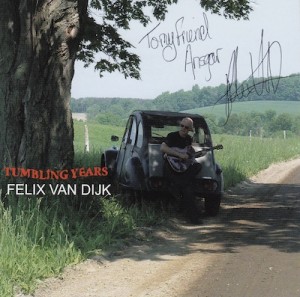 Felix van Dijk: Tumbling Years
Felix van Dijk: Tumbling Years
Veröffentlicht: 29. April 2008
VanManMusic Records 826816131321
Titel:
Barefoot In The Sand / Tumbling Years / Heart Of Our World / Forever In My Heart / Take Her To The Sky / This Lullaby / When I Dream Her Name / Grass Is Never Greener / Easy To Breathe / Now I’m Coming Back / Early Days
Der in New York lebende Songscheiber Felix van Dijk entstammt einer Künstlerfamilie. Sein Vater Rudi Martinus van Dijk (1932-2003) war ein bekannter niederländischer klassischer Komponist von Orchester-, Kammer- und Vokalmusik und machte sich auch als Pianist einen Namen. Felix van Dijk wurde zwar 1954 in den Niederlanden geboren, wuchs jedoch wie auch sein jüngerer Bruder Walter in London und Kanada auf. Obwohl Felix van Dijk bereits mit zehn Jahren die erste Gitarre sein Eigen nennen konnte, war es zunächst die Schauspielerei, die ihn faszinierte und den Anfang seiner Karriere als Künstler darstellt.
In seinen Zwanzigern kehrte die Begeisterung für die Musik zurück: Felix van Dijk vollzog die Metamorphose vom Schauspieler zum Singer-Songwriter und legte 2008 mit „Tumbling Years“ sein im Eigenverlag erschienenes Debütalbum vor. Die elf Songs zeigen Van Dijk als einen feinsinnigen und gefühlvollen Songschreiber mit einem unfehlbaren Gespür für eingängige Melodien. So verwundert es nicht weiter, dass sein Stil mit dem McCartneys verglichen wird. Während der Ex-Beatle jedoch in vielen musikalischen Ausdrucksformen zuhause ist, hat sich Felix van Dijk auf zwei Markenzeichen Paul McCartneys spezialisiert: den optimistischen Popsong und die zarte Ballade.
„Barefoot In The Sand“ eröffnet das Album allerdings mit recht rockigen Tönen. Sobald Van Dijks Gesang einsetzt ist jedoch klar, dass er diesen Stil nicht nutzt, um die Sau rauszulassen und es „den Bossen so richtig zu zeigen“ (Jack Blacks Definition von Rockmusik im Kinofilm „School Of Rock“, 2003). Er ist nur ein Vehikel für eine romantische Botschaft, verpackt in einer Melodie, die sich schon nach dem ersten Hören festsetzt. Die forsche Gangart des ersten Songs bleibt die Ausnahme. Vier Songs („Tumbling Years“, „Forever In My Heart“, „This Lullaby“ und „Early Days“) entsprechen der klassischen Singer-Songwriter-Tradition: Akustikgitarre und Gesang. Hervorzuheben sind hier die schöne Ballade „Forever In My Heart“, deren Gitarrenbegleitung an McCartneys „Blackbird“ erinnert und der rührende Titelsong des Albums. „This Lullaby“ hat seine eigene unglaubliche Geschichte: Während eines Familienbesuchs in Peasmarsh saß Felix van Dijk im Freien und arbeitete an einem neuen Song. Paul McCartney befand sich auf einem Ausritt und begegnete schließlich Felix, den er darum bat, den frisch entstandenen Song doch einmal vorzuspielen. McCartney riet zu einem Akkordwechsel an einem bestimmten Punkt und machte sich auf den Weg nach Hause. Doch nur wenige Minuten kehrte er um, ließ sich die Gitarre geben und zeigte Felix, wie er die entsprechende Stelle verändern würde. Der Rest ist Van Dijk-Geschichte.
Die übrigen Songs sind etwas üppiger instrumentiert und pendeln zwischen ruhigen Stücken wie „Grass Is Never Greener“ oder „When I Dream Her Name“, Mid-Tempo-Nummern („Heart Of Our World“, „Take Her To The Sky“), dem jazzig angehauchten „Easy To Breath“ (das mit einem ausgezeichneten Gitarrensolo aufwartet) und dem fingerschnippenden „Now I’m Coming Back“. Insgesamt also ein abwechslungsreiches Spektrum.
Felix van Dijks Musik ist unverstellt und aufrichtig. Ihm geht es nicht um Ego, Coolness, oder Rockstar-Stereotypen. Auch Gesellschaftskritik ist nicht sein Thema. „Tumbling Years“ rückt das Zwischenmenschliche in den Mittelpunkt: nachdenklich, empathisch, gefühlvoll, wehmütig, zuversichtlich und natürlich auch fröhlich. Das alles in einer ungekünstelten Form. Ein perfektes Spiegelbild des Menschen und Musikers Felix van Dijk.
Produziert wurde „Tumbling Years“ von dem 2012 verstorbenen Benjy King, der bereits mit Größen wie Rick Derringer oder Tommy James zusammenarbeitete. „Tumbling Years“ ist in Deutschland über Amazon, jpc, WOM und natürlich auch iTunes zu beziehen.
Nach „Tumbling Years“ veröffentlichte Felix van Dijk insgesamt 10 Songs, die ausschließlich als Download (siehe iTunes-Link) verfügbar sind. Darunter wunderbare Stücke wie der Ohrwurm „Dancing“, die beatligen Kompositionen „It’s Been A Good Year“ und „Penepole Grace“, die zärtliche Ballade „Inside Of You“ oder zuletzt den fröhlich-sommerlichen Shuffle „Life It’s A Gas“. Aktuell hat Felix van Dijk zusammen mit der Sängerin Ryan ein gemeinsames Projekt gestartet und Anfang Juni den gemeinsamen Song „You Silly Girl“ veröffentlicht.
______________________________________________________________
Interview mit Felix van Dijk
Unsere Zeit in New York mit Felix und seiner Frau verbrachten wir mit gemeinsamen Kochen, guten und immer lustigen Gesprächen, Sightseeing, Restaurantbesuchen, Musik hören und Fachsimpeln, Konzertmitschnitte schauen und einiges mehr. Auch ein paar Beatles-Songs wurden gemeinsam gespielt. Oft sah und hörte ich Felix an seiner Gitarre spielen und singen und dachte, dass eigentlich viel mehr Menschen seine Musik kennen sollten. Aus diesem Grund schlug ich ihm vor, ihn über ex-beatles.de vorzustellen und dafür auch ein Interview zu nutzen. Während unseres Aufenthaltes in New York gelang dies aus Zeitgründen nicht mehr, so dass ich Felix nach unserer Reise eine Reihe von Fragen schickte, die er ausführlich und hochinteressant beantwortete.
AB: Felix, you are part of a family that at least combines two creative generations. Your father was a well-known classical composer and pianist, your brother is an actor (who has a good singing voice as well, by the way), you have been an actor too. Knowing the fates of the musically Beatles’ sons, Dweezil Zappa, Jakob Dylan, Ziggy Marley and many more: Was it or is it still hard for you to follow your father’s footsteps? How did you get started with playing – and creating – music?
FvD: Because my father was a prolific classical composer and we had a wonderful father son relationship I never felt intimidated by his artistic prowess. He was always very encouraging and supportive of my talents. My interest in creating classical music was pretty much nil. I really enjoyed rock music though I do very much listen to classical as well. My father tried to teach me to play the piano when I was very young, however, I wasn’t very disciplined at that age. It’s a regret I do have that I didn’t apply myself on the piano. I naturally gravitated to the guitar when one of my uncles handed me down one of his guitars when I was about ten years old. This was at the height of The Beatles taking the world by storm. I was living in England at the time spending my time watching Top of The Pops so the pop influence was being ingrained at an early age. The Beatles, The Rolling Stones, Cilla Black, Sandy Shaw, The Kinks, The Hollies, Dave Clark Five, Dusty Springfield and the list goes on. I never took any guitar lessons and the guitar sat gathering dust after a year of experimentation and it wasn’t until I was 17 that I picked up the guitar once again and started seriously learning how to play. I think I started writing songs around 19 or 20 and they weren’t very good. There is one good song I wrote when I was around 23 called “The Call of The Wild” but I’ve not gotten round to recording it beyond a demo, but I will get to it.
AB: What are your main influences as a musician?
FvD: I’ve enjoyed many different artists such as Peter Gabriel, Genesis, Strawbs, The Beatles, Yes, Bruce Cockburn, Neil Young, Joni Mitchell, Pat Metheny, Miles Davis, Lester Bowie, Oscar Peterson. I suppose the biggest influence would be The Beatles.
When I was a kid living in London it was the swinging sixties. Carnaby street, Twiggy, and London was a trend setting city. It was an exciting time. I remember walking hand in hand with my little brother up to a cinema in Whetstone to watch “Help” which had been released the week before. I just sat there transfixed, overwhelmed by the music and cinemaphotography and witnessing the humor and charm from the fab four exude from the screen. It was a very profound experience. Music associations can solidfy memories that last a lifetime. On a humorus note, I remember quite vividly one evening watching The Rolling Stones premiere “Satisfaction” on Top of The Pops. I sat crosslegged in front of the telly (television) and my mother walked into the room carrying laundry. She stood a few moments watching a young Mick Jagger twitch and bounce around in front of the microphone singing. She turned away leaving the words “They won’t last”. She still laughs about that one when I bring it up. But getting back to The Beatles, my grandmother had made me a Beatles jacket, the one without the collar. I think there is a picture on my Facebook page of me wearing it. I wore it to school much to the envy of my classmates. I recall telling my classmates that I had tea with the Beatles. What cheek. But who would have thought that I would have met Paul all those years later. Strange how life works. When my father passed away Paul sent the most beautiful flower arrangement for the grave. It was very touching.
AB: How did your musical style develop through the years?
FvD: Interesting question. In the early years I didn’t have much of a musical voice. I think over time that develops with life experience and having the willingness to experiment with different musical styles. I think my early years in England as a boy had a profound influence on my sense of humor and outlook on life. I was fortunate to absorb the best of British culture and also be exposed to my parents worldly knowledge and experience. My life because of my father, was steeped in music. During the day I could hear him working in his studio at the piano. The sounds were very comforting because I knew he was there. Of course, I had no idea those tinklings were the basis for some incredible orchestral pieces. My mother was an educator and both my brother and I received so much love. I’m basically a very happy person who is also an optimist. This had an affect on my musical development. I tend to write very positve songs, some with a tinge of sadness and regret, however, never with any deep angst.
The closest song to angst I’ve written would be “Take Her To The Sky”. There are so many songwriters out there who have come from dysfunctional homes and it is reflected in their music and it’s a music that appeals to many people because of their own childhood experiences. As I mentioned before, I have a few songs tinged with sadness and regret, however these feelings were realistically expressed based on a previous divorce. There are times I write from a fictional perspective by imagining what it would be like to be in a particular situation.
AB: Do you identify yourself with folk, rock or pop? How would you describe your music?
FvD: I think my album “Tumbling Years“ had a mix of all three and “Easy To Breathe“ even hinted at jazz. I don’t particularly have a definitive style. Some of my songs sound Beatles influenced, however, it is not a conscious decision to sit down and try to sound like them stylistically. I think if the Beatles had never existed I would have written the same way. I’ll sit and write a song and later think that sounds Beatles like. However, there are songs I’ve written that in no ways sound like the Fab Four. I think over the years having been exposed to classical music and jazz it helped develop my sense of melody and that melodic sense sometimes has a Beatles flavor. You must remember that George Martin who was classically trained had I’m sure a profound influence on how the Beatles composed. When you think of their early music which in some ways musically and lyrically were unsophisticated but very catchy, you can see the sudden leaps they made with “Revolver”, “Sgt Pepper’s”and “Abbey Road”. Their approach to melody was more sophisticated and I think that had to do with working and observing George Martin in the studio. They were on a very quick learning curve and because of their success they were able to experiment without having to bend to the will of the record company.
AB: What inspires you most to write a song? Can you describe your songwriting process?
FvD: I can sometimes go months without writing a song and suddenly I’ll sit down with the guitar or piano and create a melody and then write the lyrics. I never write the lyrics first. The melody I’ve created clues me in to what the song should be about. Sometimes melodies come very quickly. I’ve written a new song “You Silly Girl” and I think I had the chord progression in 15 minutes for verse and chorus. In this instance a great young singer Ryan Berkowitz has written wonderful lyrics and is the singer in the recording which we hope to release soon. Sometimes I’ll suddenly feel a spark of creativity that drives me to sit down and compose a song. It is never a question of “Oh, I think I’ll write a song now”. That doesn’t work for me. If I attempt to do it this way I’ll just sit with the guitar coming up with nothing. There is a feeling I experience. It’s almost like a creative pregnancy coming to term. Something impels me to grab the guitar and start writing. It’s very hard to describe, but I think that it’s a kind of energy where you feel open and excited something is about to come to life musically. It is at these times I write my best songs.
AB: Writing is just one part of the game. Do you enjoy recording?
FvD: Recording can be very exciting and yet also quite daunting because when it comes to recording there is so much to learn. You have to know microphone placement, how to sing into a mic, be familiar with different microphones how best they perform under certain conditions. A complete understanding of sonic ranges. There is a true art to mixing and mastering and that knowledge can be the difference between creating a great recording or a merely so so one. I think with the advent of recording software there is an increase in do it yourself at home production. But there has also been a negative impact on the music industry because many professional studios have had to close their doors because of lack of business. There is a deluge of songs on the internet that are badly produced because of lack of recording know how on the part of young artists. There are reasons why recent recordings produced by Al Schmitt or Tony Visconti sound so brilliant. Experience!
AB: Writing, recording … now over to part three: Do you perform in concert?
FvD: I enjoy performing live and I’ve played in some fairly well known venues in NYC.
AB: Have you been working for other artists too?
FvD: Not really. I’ve collaborated with other writers.
AB: You and your family have various interesting relations to Paul McCartney. Tell me more about that.
FvD: Both my mother and brother have homes on either side of Paul’s place in East Sussex. Paul and my father became friends and I got to see Paul on a number of occasions. When my brother and his partner had purchased their home and had settled in, Linda McCartney appeared at their door welcoming them to the very rural neighborhood. She gave them a copy of her vegetarian cookbook which still sits in their kitchen to this very day. I also have a number of letters that were written by Paul to my father where he described his works in progress and my father no doubt shared his own with Paul.
AB: Not many musicians can say that Paul McCartney helped creating a song. But McCartney did on your track „This Lullaby“. How did that happen?
FvD: One afternoon I was sitting in a field with a guitar I had borrowed from my friend Dave Fritchley who is also a friend of Paul’s. I had been sitting there in the grass writing a new song and had completed the melody. Paul rode up on his horse and said “You must be Felix, Rudi’s son. Your Dad mentioned you were a songwriter”. Paul and I chatted a while about music and the industry. I then told Paul that I had just finished a new melody that I had to write lyrics for. Paul asked me to play it for him. So I went ahead without thinking” Christ, I’m singing to Paul McCartney” It was a bit of a time warp. Anyway, at the completion of my outdoor peformance before Paul he said “I really like that. It’s real heartfelt. You know, on the repeat in the chorus where you go to the G chord again, maybe find another chord just to give it a bit of a twist.”
I thanked Paul for the suggestion and would give it some thought. We chatted a little more and then Paul rode off on his horse. About ten minutes later Paul returned on his horse. Riding back home the melody must have stuck in his head and being the melodysmith he is couldn’t resist a little creative music sharing. Paul said “I think I may have an idea for a chord” He had me hold up the guitar so he could show me the chord because he wasn’t quite sure of the name of the chord he had in mind. Showed it to me and it never left the song.
AB: Some of your songs remind me of certain well-known melodies. „Blackbird“ comes to my mind when I listen to „Forever In My Heart“, for instance. Is there a clear intention behind that or do you „act naturally“?
FvD: “I act naturally” First of all the finger picking and the chords are entirely different in “Forever In My Heart” than those of “Blackbird”. I think the song has a definite hint of Paul in it, however, maybe what sways you to compare the two songs is that the melody though very different has a similar sentiment.
AB: What do you think of Paul McCartney’s career after the Beatles? What do you rate as his best, what as his weakest work?
FvD: I think Paul was very brave to strike out on his own after the Beatles split. I think his first album has some nice songs on it, but in terms of his best records, to me they would be “Ram”, “Flaming Pie, and Band On The Run with The Wings.
AB: Someone like Paul McCartney can do whatever he wants. But lots of talented people have to struggle hard for their music career. How is your perception of today’s music business/industry?
FvD: I think it is even harder for young musicians to make a go of it in today’s world of music. The industry has drastically changed. Because of the internet, iTunes,Mp3’s the record labels can no longer afford to take risks on new artists. If you are an independent artist and you haven’t sold 20,000 CDs on your own the record companies won’t pay attention. It is also very difficult for music artists to make a living. Just as an example, if you have a song on Pandora and it has been played 30 times, the most you can expect in residuals is about 18 cents. Also the internet is flooded with music, which in many ways is wonderful, but it becomes harder to find the gems out there. Also, I think the mp3 is destroying how we listen to music. There is only so much sonic information that an mp3 can convey. The new generation of kids growing up for the most part have never experienced the pleasure of analog sound and even if they heard it they may not hear the difference because their ears are untrained.
AB: Do you use social media to promote your music?
FvD: Yes, I use Facebook to steer people toward my music. My music is available all over the internet anywhere from itunes, amazon, CdBaby just to mention a few. And of course www.felixvandijk.com
AB: Who are your favourite current songwriters or musicians?
FvD: Bruce Cockburn, Peter Gabriel, The Blue Nile, Joni Mitchell, Paul McCartney, Peter Frampton, Adele, Shawn Colvin, Emmylou Harris to name a few.
AB: What are your projects and plans with regard to your music? When can we expect a successor of „Tumbling Years“?
FvD: Because the CD is beginning to fade away, and though vinyl is making a comeback, there is less inducement to create albums when the public is more interested in purchasing the songs they like. They don’t have to spend more than they have to in order to listen to what they enjoy. I’ve been songwriting with no plans for an album, however, maybe I’ll put out a compilation of new material.
AB: How can people buy your records/songs?
FvD: On Amazon, iTunes, CDbaby.com, and a number of other music websites. People can also hear my songs in full and order on my website www.felixvandijk.com. I offer this because most of the other song selling services only provide you with a snippet of a song when listening.
AB: Please name five albums you would choose for a desert island.
FvD: „Abbey Road“, „Dark Side of The Moon“, Framptons first solo album “Frampton’s Camel”, „Brandenburg Concertos“ Karl Richter and the Munich Bach Orchestra, Collection of my father’s music.
AB: Thank you so much, Felix!

